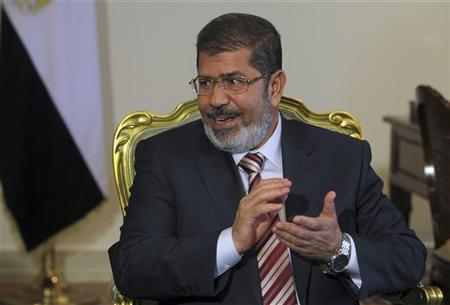President Morsi's radio show fails to attract listeners

The latest attempt of recently-elected President Mohamed Morsi to reassure Egyptians that he is determined to serve them all has taken the form of a daily vocal appearance on the radio show The People Ask and the President Answers during the month of Ramadan.
In the weeks preceding Ramadan, a radio advert circulated on state-owned radio channel El-Bernameg Al-Aam 104.7 asking citizens to voice their concerns and demands, to be answered by the president during the month of Ramadan.
The four-minute programme is the first of its kind to be aired in Egypt; the idea was initiated by prominent radio presenter Amal Fahmy. She envisioned a show that could tackle different issues concerning citizens by interviewing them and then giving space for the president to comment.
The choice of the timing of the show, however, has possibly made it difficult to reach a wide audience. With transmission immediately after sunset prayers, most Muslims at this time are gathering to break their fast.
“I have never heard of the show," said Hassan Othman an engineering student. "And I haven't heard anyone mention it."
“The programme has obviously failed to promote itself; a show by a president should definitely have higher exposure,” added Othman.
The student also suggested that the "media blackout" on the show could be intentional, “given the ongoing wave of criticism of Morsi by state-owned media outlets.”
On Tuesday Morsi’s spokesman Yasser Ali stated that the presidential office has filed law suits against two media outlets – which he did not name – for publishing false news concerning the president.
“Such an idea should have been done in a more professional way that would reach more people. It can’t just be during Ramadan, it’s not a TV series,” Othman added.
That Ramadan is a time of the year known for its flood of TV shows and high rate of advertisements, raises even more questions about the fact that a first-of-its-kind show presented by the president was not advertised except on the hosting radio channel and the Muslim Brotherhood’s channel Masr 25.
On the show, Morsi gives broad answers to pre-recorded short questions in a clear attempt to reassure listeners that a better time for Egypt is yet to come.
“Many have suffered a lot under the state of emergency law, and we call for the president to look after those who have been victims of the unjust law,” says Ali Abdel-Azim from Upper Egypt’s Assiyut in one of the episodes.
Emergency law was in place in Egypt from 1981 - when Hosni Mubarak came into office - until 2012. It allowed police and security forces to violently arrest and torture citizens without clear legal procedures.
In response to Abdel-Azim's comments about emergency law, Morsi who used to be a member of the Muslim Brotherhood, a group that along with many political forces was persecuted by the Muabrak regime, said, "He who has experienced injustice can never impose it on others."
Morsi added that he has released all political detainees who were arrested from the time of the start of the January 25 uprising until today.
On 19 July, Morsi indeed ordered the release of 572 Egyptian citizens who had been detained by military authorities since last year's Tahrir Square uprising, although some remain in detention.
In spite of the low numbers tuning into the show, many are determined to be optimistic with regard to president Morsi's efforts.
Although Sahar, a niqabi (a woman who wears the face veil) has also not heard of the show, she applauded Morsi for agreeing to answer questions on the programme. She expressed doubts however about how much he can actually do.
"He is trying to get closer to the people, trying to comfort us, but we know he can't do anything when he's handcuffed by the military council," said Sahar.
On 17 June, just before Morsi was inaugurated as president, the military council known as the Supreme Council of the Armed Forces (SCAF) issued constitutional addendum. The main upshot of the amendments was that several powers were transferred from the office of the president to the military council.
Sahar gave her vote to Morsi in both the first round and the runoffs of the elections, and is optimistic that the Muslim Brotherhood president has much to offer the country.
Meanwhile, law student Salma says she has only listened to one episode of the show.
"I thought the idea in itself was great. I still have doubts, but I'm hoping that he works for the good of the public and not just the Muslim Brotherhood," she said.
Issues such as the judiciary, sanitation and social justice have been tackled in different episodes.
“Garbage is never removed even though we pay the monthly bill,” said Hoda Kamel from Helwan in an episode tackling sanitation in Egypt.
The president who initiated a campaign recently urging citizens to contribute to cleaning the country stressed that “sanitation is one of his top five priorities in his first 100 days in office.”
Morsi adds that he has been taking the required measures to resolve the issue by calling officials responsible for providing clean surroundings for Egyptians. He emphasised however that the issue will not be resolved except with collaboration between the government and the people.
"There is much more to be done than simply trying to comfort people through words, we need actions," says engineering student Othman. "If he really delivers on any of his promises, people will not need a radio or TV programme to know it."









facebook comments